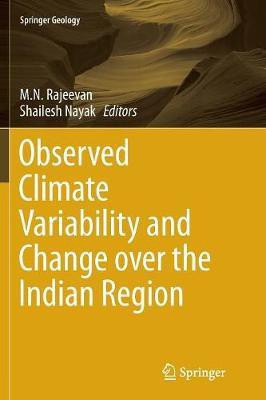Observed Climate Variability and Change over the Indian Region(English, Paperback, unknown)
Quick Overview
Product Price Comparison
The objective of the book is to make a comprehensive documentation of the observed variability and change of the regional climate system over the Indian region using the past observed data. The book addresses all the important parameters of regional climate system so that a physically consistent view of the changes of the climate system is documented. The book contains 16 chapters written by the subject experts from different academic and research institutes in India. The book addresses all important components/parameters of the climate system, like rainfall, temperature, humidity, clouds, moisture, sea surface temperature and ocean heat content, sea level, glaciers and snow cover, tropical cyclones and monsoon depressions, extreme rainfall and rainstorms, heat waves and cold waves, meteorological droughts, aerosols, atmospheric aerosols, ozone and trace gases and atmospheric radiative fluxes. One chapter deals with the past monsoon using monsoon proxy data. The last chapter deals with the future climate change projections over the Indian region (rainfall and temperature) made using coupled climate models. Most of the analyses (especially on rainfall, temperature, extreme rainfall, sea surface temperature, meteorological droughts) are based on the data for a longer period of 110 years, 1901-2010. For some other parameters like moisture, clouds, heat waves and cold waves, atmospheric aerosols, ozone and trace gases and radiative fluxes, data of shorter period have been used. The articles documented inter-annual and decadal variability in addition to documenting long term trends of different parameters. The trends have been tested for statistical significance using standard techniques. It is expected that the present book will be an excellent reference material for researchers as well as for policy makers. These results will be useful in interpreting future climate change scenarios over the region being projected using coupled climate models. Further analysis of these results is required for attributing the observed variability and change to natural and anthropogenic activities.


